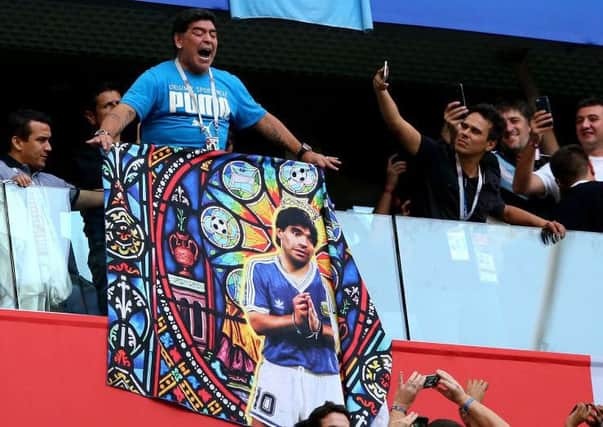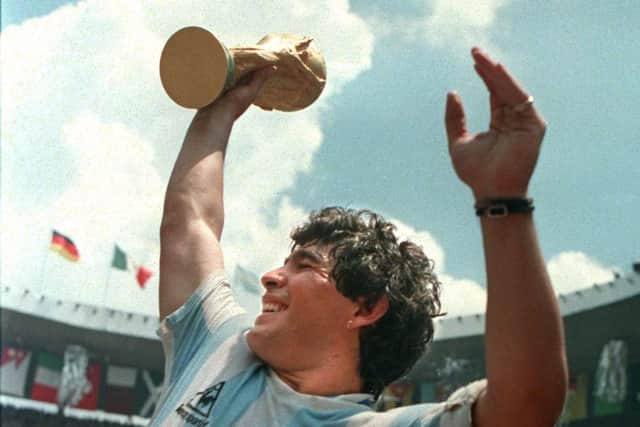Joel Sked: Diego Maradona's wild celebrations should be cherished


On Tuesday night in St Petersburg, at a time of the year when the city celebrates its White Nights, when darkness is seldom seen, Maradona once again reached into the sky. Only on this occasion it was both arms outstretched, for a second in time this Argentinian deity resembled Brazil’s most famous landmark, Christ the Redeemer.
Advertisement
Hide AdAdvertisement
Hide AdHe then clasped his chest with both hands, staring wildly into the sky and shouting his thanks to god.


Prior to the start of the game the BBC scanned the crowd where the boisterous Argentine fans held aloft a flag featuring the images of three men: Pope Francis, Lionel Messi and Diego Maradona. Only, in Argentina they are more than men, they are reverential figures.
It was the latter two who would define this tense, stressful and ultimately fulfilling night for Argentinian football. On the pitch Messi conjured up a heavenly moment, collecting the ball on his knee, dropping it to his foot then unleashing a ferocious shot to send the stadium on Krestovsky Island into raptures. It was Dennis Bergkamp-esque. It was divine.
And it was that goal which prompted the release of such emotion from Maradona, Argentina’s number one fan, and critic, plus the subsequent images shown around the world.
The extravagant celebration prompted Gary Lineker to warn Maradona that he was “in danger of becoming a laughing stock”. Only, more was to follow. Pictures showed Diego dozing off in his private box at the stadium, another video captured him clearly intoxicated and not fully aware of his surroundings, a change in mood from his dancing exploits with a Nigerian fan prior to the game.
The coup de grâce arrived after Marcos Rojo’s late goal which took Argentina into the last-16. The camera panned to him hugging friends before, in a flash, switching to angrily giving a double middle finger gesture to those in front.
Despite the magic of Messi, Argentina’s redemption and the continuing unfolding of drama at the World Cup, Maradona became a big story, whether that be in the newspapers, by pundits or on social media.
Advertisement
Hide AdAdvertisement
Hide AdNews emerged after the game that 57-year-old had been taken to hospital and even rumours he had had a heart attack. He confirmed he was seen to by a doctor and that he had drank too much white wine, but the worst he had suffered was a sore neck.
For once he took attention away from the team, rather than acting as a microscope and magnifying issues, whether it be directly or indirectly.
The BBC took time out of their post-match analysis of a joyous footballing moment to condemn his behaviour. Lineker is a fine broadcaster, funny and insightful, but his approach and tone was sanctimonious. Others on social media labelled him an “absolute disgrace”.
His actions before, during and after the game were not disgraceful. Crazy, yes. Embarrassing, maybe. But put a camera on any football fan for 90 minutes and most could be made to look maniacal, whether that be gestures or facial expressions.
Tuesday night was far from the worst of Maradona, especially this tournament where he has been caught up in a race row and filmed doing shots on a plane next to what looked suspiciously like a bag of recreational drugs. Tuesday night was certainly not an “absolute disgrace”. It was a man enjoying life, enjoying football in his own expressive way. And it was actions which see him loved around the world, the flawed, controversial genius.
They were perhaps not one fitting of a Fifa ambassador, a role he took up last year. In other words, he’s now a glorified show pony, reportedly paid £10,000 for an appearance at and event. Someone to gawk at, have your picture taken with. Touch, prod and pester.
Yet, when it comes to the Argentinian national team Maradona can be free. He can be a fan, like he was in Germany in 2006 and then in Brazil four years ago, a tournament in which he stuck his middle finger up on live TV.
It is right that there are concerns about the possibility of Maradona relapsing into those dark days which date back to his playing days or worse, when his health reached rock bottom in 2007 and vigils were being held in Buenos Aires.
Advertisement
Hide AdAdvertisement
Hide AdBut the holier-than-thou sentiment towards one of football’s greats, a man nearing his 60s is in itself cringeworthy. Especially to a man who has lived his life and troubles in the public eye. A man who has a church named after him.
His celestial standing will forever hang over the Argentinian national team for what he did at the 1986 World Cup. And he will continue to stand over the team from the stands, to cheer them on, to see if Lionel Messi, or someone else, can produce the moment 32 years in the making.
If so, even Lineker et al will forgive Maradona for enjoying himself any way he likes.
• READ MORE: Andrew Smith: Things are all looking a bit Messi